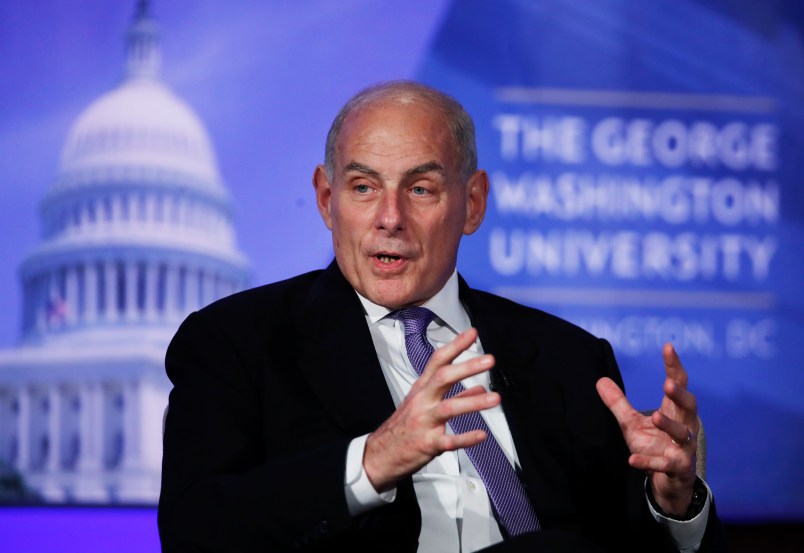Two days after saying that marijuana was “not a factor” in the in the drug war, the Secretary of the Department of Homeland Security warned that it was “a potentially dangerous gateway drug” and said his agency would pursue the enforcement of laws against it.
DHS doesn’t have much legal authority to pursue drug-related arrests of U.S. citizens, if they aren’t involved in transnational crime — that responsibility falls to local law enforcement, the Drug Enforcement Agency, the FBI and others.
But the agency pursues the flow of illicit drugs into the United States through U.S. Customs and Border Protection, and considers past drug charges and convictions in the cases of undocumented immigrants who could be deported by Immigration and Customs Enforcement.
In an interview with NBC’s Chuck Todd Sunday, DHS Secretary John Kelly said that marijuana was “not a factor” in the drug war (methamphetamines, cocaine and heroin were, he said). He seemed to change his tone Tuesday in a speech at George Washington University, according to a copy of prepared remarks provided by DHS.
“And let me be clear about marijuana. It is a potentially dangerous gateway drug that frequently leads to the use of harder drugs,” Kelly said, adding: “Its use and possession is against federal law and until the law is changed by the U.S. Congress we in DHS are sworn to uphold all the laws on the books.”
“DHS personnel will continue to investigate marijuana’s illegal pathways along the network into the U.S., its distribution within the homeland, and will arrest those involved in the drug trade according to federal law,” he continued. “CBP will continue to search for marijuana at sea, air and land ports of entry and when found take similar appropriate action.”
And marijuana possession, distribution and convictions thereof, Kelly said, would be considered “essential elements” for ICE “as they build their deportation / removal apprehension packages for targeted operations against illegal aliens. They have done this in the past, are doing it today, and will do it in the future.”
Kelly just finished a trip to the U.S.-Mexico border with Attorney General Jeff Sessions, known for his vocal criticisms of marijuana use, and the subject of speculation over how forcefully he intends to enforce federal law in states and cities where the drug is legal for recreational or medicinal use, or decriminalized.
On March 15, Sessions said marijuana was “only slightly less awful” than heroin. But the same day, he said he thought “much” of the Cole Memorandum was “valid.” The Obama-era policy states that federal law enforcement will not pursue most marijuana charges where the drug is legal at the local level.
“[W]e’re not able to go into a state and pick up the work that police and sheriffs have been doing for decades,” Sessions said of the rule.
In an August 5 memo, Sessions announced that subcommittees of the department’s Task Force On Crime Reduction and Public Safety would review its marijuana enforcement policies.







The withered claw of Jeff Sessions draws a line through fact, again.
Does this mean that Kelly is subservient to Sessions? This is quite a reversal.
Gateway to Twinkies?
Shorter Kelly: My spine belongs to Beauregard.
and Doritos. . . . probably no one can benefit financially from these food products whereas private prisons will rake in the $$$ for some members of this administration.